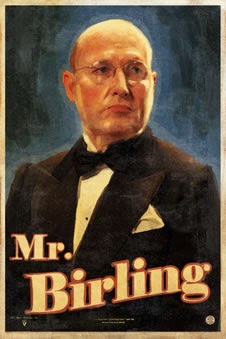
Hi,
The following essay plan comes from my old GCSE blog. I was predicting a Mr Birling question, so came up with the plan below.
As yours in the first exam in a new spec, anything could come up! But here's a plan for how to tacke a Mr Birling question.
Possible titles:
- How does Priestley undermine Mr Birling in An Inspector Calls?
- Mr Birling is a static character and is nothing more than a personification of capitalism. How does Priestley use Mr Birling to criticise capitalism?
Here's some thoughts about how to structure an answer to one of these questions:
Intro - first impressions:
stage directions and early dialogue - 'provincial speech' and manner hints at modest roots, but he's very quickly forgotten where he came from. Selfish and business obsessed - even at daughter's engagement: 'lower costs and higher prices' - Priestley hinting at his attitude towards his workers. Desperate to impress Gerald and possibly insecure. Hints that he's not as 'comfortable' as he tries to make out. Worries about the Crofts not being there and whether the celebration is lavish enough.
Dramatic irony:
Titanic - obvious reference which makes him sound buffoon-like. Repetition and categorical assertions ('unsinkable... absolutely unsinkable) highlight his over-confidence. War - more emotive. The references to 1940, Russia and H.G Wells/G.B Shaw would resonate with a 1940s audience in particular, and highlight the capitalist/socialist dichotomy. Think about it: he's criticising people like Priestley (and presumably, his audience too.)
Interrogation:
His attempts to intimidate Goole show that he's self-important and feels like he should be above the law. He is set up for a fall. Defensive quotes: 'If everyone was responsible...awkward.' etc. Euphemisms: 'horrid business'.
Comments on the interrogation of others:
Initially seems glad to not be the only one involved. Criticises others. Defends Gerald's adultery etc.
Realisation:
'Inspector, I'd give thousands' etc.
Ending:
Ends up laughing at the 'famous younger generation'. Circular structure mirrors his return to complacency. Somewhat lighthearted, silly language shows his growing excitement at getting away with it. 'By jingo, a fake.'
Conclusion:
Birling = capitalism. Static character intended to personify all the faults and complacency of Edwardian England - which led us, in Priestley's view, to war. Characterisation is not subtle - we are meant to see him as a buffoon from the very start. Whatever he says after the Titanic reference is not to be trusted - neither are his capitalist views. Titanic as metaphor for Birlings with their confidence, wealth and ultimately, their downfall.
Thanks for reading,
Mr M
Thanks this really helped🙏
ReplyDelete❤️